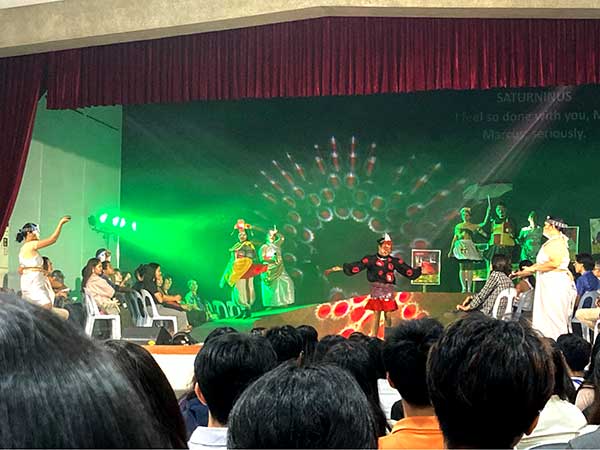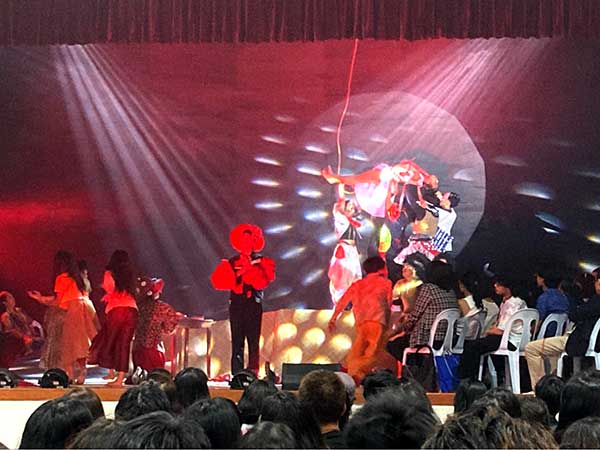By John Anthony S. Estolloso
LAST DECEMBER 4 to 6, the University of the Philippines – Visayas played host to the 6th Biennial Conference of the Asian Shakespeare Association. The three-day affair brought together an international mix of the Bard’s enthusiasts, scholars, and performers, giving credence that the Bard’s prestige does grow through his eternal lines: centuries have passed yet the allure of the Shakespearean stage has not lost its vibrance.
Capping the day-long series of talks and conversations were performances of Shakespeare’s plays. With acclaimed playwright Anton Juan and directors Ryan Puljanan and Jemuel Garcia, Jr. at the helm of the production, Teatro Tayo and their affiliate arts groups gave new voice to the Bard’s stories. Two dramatic performances cut to contemporary contexts and sundry languages were the fare of the evenings: Titus Andronicus and Julius Caesar. Truly yours managed to catch the former; the latter remained a coveted albeit frustrated desire. So much for daggers at the Capitol.
Titus Andronicus is the quintessential Shakespearean political drama, employing the usual formulae of political powerplay: a combination of family feuds, shaky alliances, betrayals, and assassinations plague the narrative. Ironically, there is no Titus Andronicus in Roman history: some scholars allude to Shakespeare combining the lore of a minor Roman general with the Ovidian myth of Philomela and Procne, which had curious parallels to the tragic mutilations of Lavinia and the cannibalistic final banquet of the final scene of the play.
One might say that among the Bard’s Roman plays, Titus Andronicus is the stylized myth that has more bearing as a cautionary tale than historical drama. Last week, he took to the stage once more and became Titus Tan of Iloilo City.
In the Hiligaynon retelling, Titus Tan is a once-exiled mayor, returning to the city to great acclaim – more so that he enters the theatre astride a motorcycle. The audience inhales a bit of the noxious fumes from the vehicle and the cloak-and-dagger dramatics commence. The siblings Saturninus and Bassianus, from the incumbent family leading the plebs, receive the returnee and proceed with the demagoguery, sharpy interjected with interfering relatives and Hiligaynon expletives. Needless to say, the discerning Ilonggo audience understood what was mirrored onstage.
The plot becomes convoluted, which is not unusual for a Shakespearean play. As profanities were thrown between characters, hormones and innuendoes run amok, and violence runs rife and riot. Personalities turn into butchers of men and mayhem overtakes the onstage: reprisal piled upon reprisal, and amid the spate of mutilations and molestations, the audience reluctantly comes to terms with the volatile fluidity of power and those who were consumed by it. Here is the human propensity for megalomania magnified: the insertion of a portrayal of the plight of our indigenous communities drove home the point that beneath the brawling powers-that-be are the minorities who are sadly trampled upon.
* * * * *
Was the production théâtre de l’absurde? Perhaps. There was something sharply Artaudian yet also lucidly Brechtian about the play – and Anton Juan was clearly not one to avoid the controversial. The costumery was made of trash. Phallic representations as characters occasionally stepped in for a sleazy appearance. A lean but lively brass band made an unexpected appearance to further mock the theatrical politics. And as if to underline the rottenness of the politicking and the butchery, the buzzing of an itinerant fly darting from one literal corpse to the next metaphorical one reinforced the repulsiveness of powerplay gone awry.
Reimagined as Titus Tan, Titus Andronicus was farce elevated to political satire and while the tragedy of the plot was never diminished by the comic antics of the performers, the interpretation left the audience between grins and grimaces. Punctuated by the morbid outcome of betrayals, one can but ponder about the horrors cooked up in the narrative to highlight the grim undercurrents keeping dirty politics afloat. Through the directors’ lens and the actors’ craft, Shakespeare’s characters must provoke politically – or die trying.
All in all, the play was the Bard ranting about human affairs, even beyond the grave; having framed the words of his narrative in a contemporary Ilonggo context, the performance thus rendered Shakespeare ‘Filipino’. In all appearances, the playwright still held sway over our theatrical sensibilities, even for just a single evening: all the world remain his stage and we are always but mere players to his projections of the human condition.
(The writer is the subject area coordinator for Social Studies in one of the private schools in the city. The photos are from Mr. Vic Salas.)























